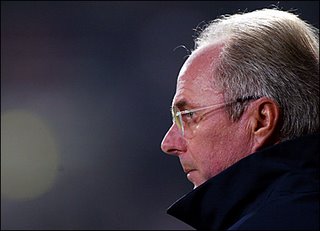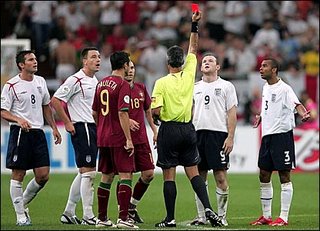Axis & Allies & Ignorance
The World Cup's semi-finals have resolved themselves neatly into Axis & Allies pairings. Germany and Italy are up first on Tuesday in Dortmund, while the French and Portugese play the next day in Munich. (For the sticklers among you, Portugal was officially neutral during the second war, but provided the Azores to the Allies as a naval base, took in Jewish refugees, and maintained its 600 year alliance with England.)
A sensible football fan would preview the semi-final matches. I am not a sensible fan: I am an England supporter. And as such, I remain mired in the past.
What to make of Sven?
In his match commentary, Sheamus performed a remarkable simulation of the English press, writing at half-time "We can all agree that Sven is useless. If England win, its despite his bumbling."

This view has passed into conventional wisdom. The Mail on Sunday headlined "It all ends in tears...but at least there's no more Sven." News of the World Columnist Martin Samuel summed up: "He leaves his post today, taking with him the king's ransom that was his reward for five years of mediocrity." The News, of course, is the paper that chronicled Eriksson's romantic interests in clinical detail, and ultimately dispatched a reporter disguised as a fake sheikh in the hopes of entrapping Eriksson out of his job. It worked.
Former England Manager Graham Taylor, now writing for the BBC, said that "there will be more against than for now that Eriksson has gone...my honest opinion is that he is not a better or worse coach than all of us - there is nothing extra special about him."
As I pointed out during an earlier defence of Eriksson, this is bunk. Sven-Goran Eriksson is the winningest manager in England’s competitive history. Going into the Cup, Sven’s side had lost only 3 times in 33 competitive matches: now it's 4 out of 38.
Over five years his teams achieved 80% of the points available. Eriksson's immediate predecessors in the 1990s managed just 57%. Graham Taylor himself managed 63%, taking the team to an 8-8-3 (W-D-L) record during his three-year tenure.
Moreover, after five years, Eriksson's squad have finally achieved a milestone: a sustained record of success that guarantees they will be seeded by football's bizarre formulas.
Two of Eriksson's decisions for this tournament puzzled many: selecting Theo Walcott for the squad over Darren Bent, and tinkering with England's formation.
I can't defend every decision the man made. But I do know this: England has never had a better manager, and it's prospects under new management are bleak. The squad's veterans are due to turn over, and the next generation shows little promise. England's U-21 side failed to qualify as one of the 8 teams in UEFA's 2006 U-21 tournament. Which brings us to the second question:
What to make of Wayne Rooney?
 The tag-team of Andy & Alex were appalled that Rooney was sent off during the Portugal match. I wasn't. Watching elsewhere, it was instantly clear what was going to happen as soon as he shoved Ronaldo. Most of the room I was with screamed in dismay and horror at what was coming.
The tag-team of Andy & Alex were appalled that Rooney was sent off during the Portugal match. I wasn't. Watching elsewhere, it was instantly clear what was going to happen as soon as he shoved Ronaldo. Most of the room I was with screamed in dismay and horror at what was coming. Rooney claimed in a written statement he was "gobsmacked" by the decision -- that he didn't see it coming. He also claims that he still thinks what he did "didn't warrant a red card."
For that alone, I would leave Rooney at home for the Euro 2008 qualification round. He has learned nothing, and is obstinate in his ignorance. He's attacked his team captain, been sent off in a Champions League match, stormed off the field in the tournament match against Sweden after being substituted (one tournament blog caled it "a spectacular touchline tantrum"), and now been sent off in the World Cup quarter-final for the double-crimes of groin-stomping and shoving.
None of this comes as news. In 168 club matches, Rooney has received 38 yellow cards and 2 reds, while scoring 53 goals. Contrast that with Darren Bent's 186 matches, 78 goals and 5 cautions. Rooney is often excused because of his 'youth;' Bent is a year younger.
In truth, there is no excuse for Rooney's behaviour, and every time he steps onto the pitch he puts the whole team at risk. David Beckham, who was villified after being sent off in the '98 Cup, has asked the fans and media to go easy on the boy -- he's too important to England's future.
I would counsel the opposite: precisely because he is so important, someone has to make Rooney listen, and help him change his ways.
There are some signs of hope in the press. The Daily Telegraph judged that Rooney "stupidly succumbed to an appalling rush of blood to the head." Its Evening counterpart called it "Rooney's evening of shame."
The Sun headlined that "Red Card Roon is to Blame" for "another moment of madness." They also awarded Rooney the lowest player rating of the tournament, commenting that "Roo once again underlined that Wayne's World is a totally different planet from the one where everyone else lives."
In the Observer, the esteemed Claudio Ranieri counselled England not to "kid themselves that the premature end to Wayne Rooney's World Cup was undeserved or unfairly harsh."
Why beat the point to death? In the hopes that fans who find themselves about to make an excuse for Wayne Rooney (sample: "The Portugese are a farce. Every time the ref makes a call, they are up in his face;" "He did step on his nuts, but it was an accident;" "The Portugese guy got off scot free for more of a push against the English defender earlier") think twice about what it is they're defending.
Wayne Rooney does not need our defence. He needs discipline, and he needs help. And until he reforms, he does more harm than good to England's national team.



3 Comments:
Sven was coaching the most talented English side in a generation, so it should stand to reason that he would be more successful than his predecessors. But he could never get them over the hump, and a stellar record in the preliminary rounds of international competitions shouldn't mitigate that.
The fact is, the English hated him because he wasn't English. But I do think his decision to bring Walcott, and to leave Bent or Defoe at home, was very stupid. Once Owens was injured, the team was at a discernible disadvantage. It would have been even more pronounced had England won the shootout against the Portuguese, as Rooney also would have been out for a game.
The "most talented side" argument doesn't wash. Eriksson was preceded by one of the worst managers in history, Kevin Keegan.
Keegan's record in '99-'00 was 7-7-4 (W-D-L). Just looking at the year 2000, his 9 matches included 3 wins, 3 draws and 3 defeats (to Portugal, Romania and infamously Germany, in the final match played at Wembley).
This is the squad Eriksson inherited. Just looking at Eriksson's 2001 matches (to minimize credit for later player development), the Swede's record was 7 wins, 2 ties, 1 loss. Same team. Different managers.
As for getting "over the hump" I can't fathom what you mean...unless you mean to imply that only winning the Cup counts, or that England should expect to reach the semi-final or final routinely. Have you forgotton the black hole that was the 1990s?
Sven led England to the quarterfinals in 2002 and 2006. His predecessors? 1998: round of 16; 1994: failed to qualify for the tournament.
Only in 1990 was there hope: a run to the semi-final. Other than 1990, no England team has made the semi-final, except of course for '66.
So what's a reasonable expectation for England under Sven's management, or anyone else's? And how are we to evaluate two straight quarterfinal appearances?
By all historical standards, it's exceptionally good, and consistent. Sven also worked in a quarterfinal appearance at the European championships: an event England has never won. England has competed for the Euro 11 times, failing to qualify for the tournament 4 times, and failing to advance from the group phase 4 times. Only in 1968, 1996 and 2004 did they do better.
Football had its birth in England, but there is no question that the English players lag their Continental and Latin rivals in skill. The key word in your statement is this was "the most talented English side in a generation." Over the past 6 years it was never close to the talent levels of the French, Italian or Brazilian sides, and its best players were overmatched by individual performers from other powers such as Argentina, Spain, Germany, Portugal, Netherland and Czech.
Finally, I will continue to argue that Sven's greatest achievement was to put together a six-year winning record that got England to the top of the seeding formula. You only get there by being (a) consistent, and (b) doing well at the tournaments. Just ask the Dutch and the Americans, who were narrowly edged in the seeding by Italy. All those preliminary round matches counted, and they counted big.
Post a Comment
<< Home